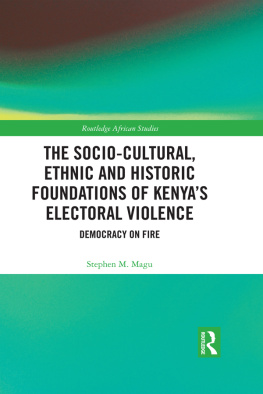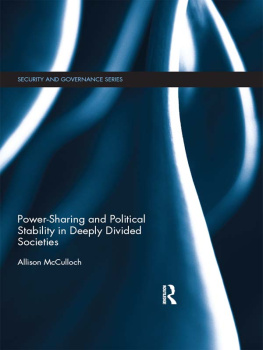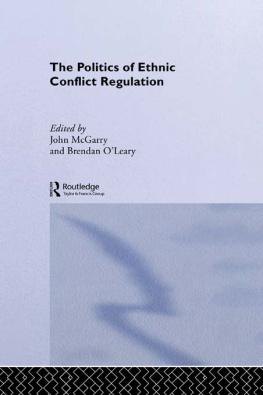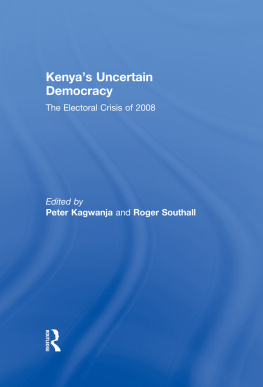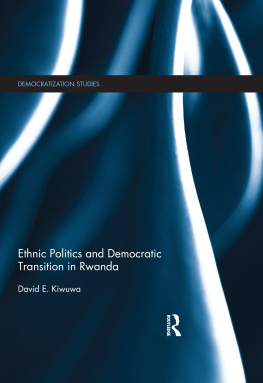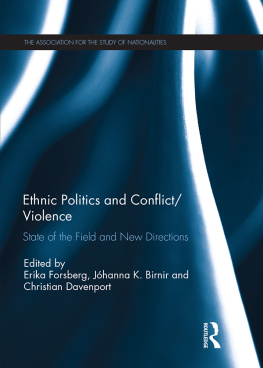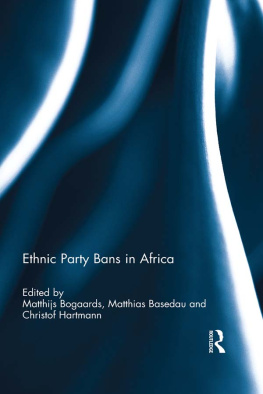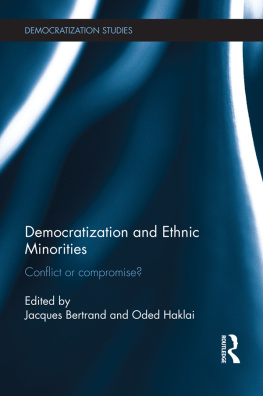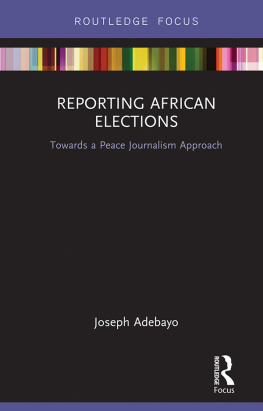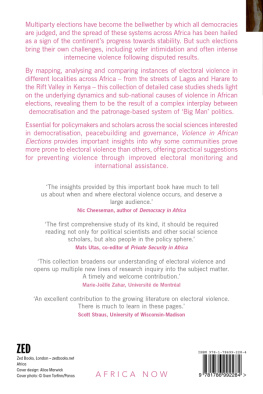The Socio-Cultural, Ethnic and Historic Foundations of Kenyas Electoral Violence
Kenyas 2007 General Election results announcement precipitated the worst ethnic conflict in the countrys history; 1,133 people were killed, while 600,000 were internally displaced. Within 2 months, the incumbent and the challenger had agreed to a power-sharing agreement and a Government of National Unity.
This book investigates the role of socio-cultural origins of ethnic conflict during electoral periods in Kenya beginning with the multi-party era of democratization and the first multi-party elections of 1992, illustrating how ethnic groups construct their interests and cooperate (or fail to) based on shared traits. The author demonstrates that socio-cultural traditions have led to the collaboration (and frequent conflict) between the Kikuyu and Kalenjin that has dominated power and politics in independent Kenya. The author goes onto evaluate the possibility of peace for future elections.
This book will be of interest to scholars of African democracy, Kenyan history and politics, and ethnic conflict.
Stephen M. Magu is Assistant Professor of Political Science at Hampton University, USA.
Routledge African Studies
For a full list of available titles please visit: www.routledge.com/African-Studies/book-series/AFRSTUD
18 Sexual Violence in Conflict and Post-Conflict Societies
International Agendas and African Contexts
Edited by Doris Buss, Joanne Lebert, Blair Rutherford, Donna Sharkey and Obijiofor Aginam
19 Land Reforms and Natural Resource Conflicts in Africa
New Development Paradigms in the Era of Global Liberalization
Edited by Tukumbi Lumumba-Kasongo
20 Cultural Entrepreneurship in Africa
Edited by Ute Rschenthaler and Dorothea Schulz
21 The New African Diaspora in the United States
Edited by Toyin Falola and Adebayo Oyebade
22 Human Rights, Race, and Resistance in Africa and the African Diaspora
Edited by Toyin Falola and Cacee Hoyer
23 Inclusive Growth in Africa
Policies, Practice, and Lessons Learnt
Edited by Steve Kayizzi-Mugerwa, Abebe Shimeles, Angela Lusigi and Ahmed Moummi
24 Africa in Black Liberal Activism
Malcolm X, Stokely Carmichael & Walter Rodney
Tunde Adeleke
25 Global Africans
Race, Ethnicity and Shifting Identities
Edited by Toyin Falola and Cacee Hoyer
26 The Socio-Cultural, Ethnic and Historic Foundations of Kenyas Electoral Violence
Democracy on Fire
Stephen M. Magu
First published 2018
by Routledge
2 Park Square, Milton Park, Abingdon, Oxon OX14 4RN
and by Routledge
711 Third Avenue, New York, NY 10017
Routledge is an imprint of the Taylor & Francis Group, an informa business
2018 Stephen M. Magu
The right of Stephen M. Magu to be identified as author of this work has been asserted by him in accordance with sections 77 and 78 of the Copyright, Designs and Patents Act 1988.
All rights reserved. No part of this book may be reprinted or reproduced or utilised in any form or by any electronic, mechanical, or other means, now known or hereafter invented, including photocopying and recording, or in any information storage or retrieval system, without permission in writing from the publishers.
Trademark notice: Product or corporate names may be trademarks or registered trademarks, and are used only for identification and explanation without intent to infringe.
British Library Cataloguing-in-Publication Data
A catalogue record for this book is available from the British Library
Library of Congress Cataloging-in-Publication Data
Names: Magu, Stephen M., author.
Title: The socio-cultural, ethnic and historic foundations of Kenyas
electoral violence: democracy on fire/Stephen M. Magu.
Other titles: Routledge African studies; 26.
Description: New York: Routledge, 2018. | Series: Routledge African
studies; 26 | Includes bibliographical references and index.
Identifiers: LCCN 2017049539 | ISBN 9780815350651 (hardback) |
ISBN 9781351142441 (e-book)
Subjects: LCSH: ElectionsKenya. | Political violenceKenyaHistory. |
KenyaEthnic relationsPolitical aspects. | KenyaPolitics and
government19782002. | KenyaPolitics and government2002
Classification: LCC JQ2947.A95 M34 2018 | DDC 324.96762dc23
LC record available at https://lccn.loc.gov/2017049539
ISBN: 978-0-815-35065-1 (hbk)
ISBN: 978-1-351-14244-1 (ebk)
Typeset in Times
by Apex CoVantage, LLC
Shortly after the announcement of the results of the general election in December 2007, Kenya, a country once considered the bastion of peace in a tumultuous East Africa, was on fire, in a Rwanda-esque-type ethnic conflagration, with different communities appearing intent on exterminating the perceived enemy community, based on age-old land grievances, interspersed with genuine electoral malfeasance protests. Of course, the tensions had been simmering for long: 10 and 15 years previously, right before and after elections, the conflicts over land and domination of government especially by one ethnic group caused other ethnic groups to chafe. Ethnic conflict was to be expected; other than perhaps Tanzania, it is nigh impossible to find one African democracy that has not been racked by some sort of ethnic-driven electoral violence, including those countries thought to be ethnically homogeneous. Like Somalia.
The overriding questions, of course, were, What had gone wrong with this former island of tranquility, and why were Kenyans butchering each other in what threatened to re-create the tragedy of Rwanda of 1994? After all, Kenya was a former British colony, a staunch ally of the US, the North Atlantic Treaty Organization, and its Western partners against the Soviet Union and the Warsaw Pact during the Cold War and now was perhaps a reluctant partner in the global war on terror. Western powers, after taking a lot of heat over hand-wringing in Rwanda in 1994, were not about to let Kenya go Rwanda . The solution was going to be a rapid attempt at containing the violence, using everything from coercion to compellence and the result was the later much-disparaged nusu-mkate (half-loaf) coalition government, the consequence of a rapidly, internationally negotiated arrangement.
The coalition government was formally known as the Government of National Unity (GNU); it ushered in a 5-year power-sharing government between the president, Mwai Kibaki, and his eternal nemesis (or the grand enemy of Kibakis people ), Raila Amolo Odinga. GNU would decidedly pacify the raging conflict, even as international development partners and major powers threatened dire consequences, sanctions and, possibly, invocation of the doctrine of the Responsibility to Protect (R2P) to the principals, if the fighting did not abate and Kenya was allowed to go the Rwanda or Somalia way. The principals decided it was foolhardy to play chicken and relented; multilateral diplomacy had won the day, and the concept of international R2P had won.
The factors underlying the genesis of the post-election violence are of special interest. Was it an issue of rigging (ballot stuffing and/or stolen election) results, threatening to overshadow decades of peace in practically the only non-socialist country in the East African region? Was it the work of unemployed youth, paid off by wealthy politicians to harass ethnic groups that were perceived to be different and to not have voted for the candidate in the predominant community in certain areas? Was it decades of pre-colonial, colonial and post-colonial tribal animosity, now fueled by a process that inherently favors numbers (which are then driven by ethnic identity/identification) boiling over, threatening to devastate the country? Or was it the shot across the bow, the template for future elections in Kenya and the dispute/conflict resolution, one that would pave the way for similar governments in Zimbabwe and perhaps the Ivory Coast? More important, what was the primary cause of the violence?

